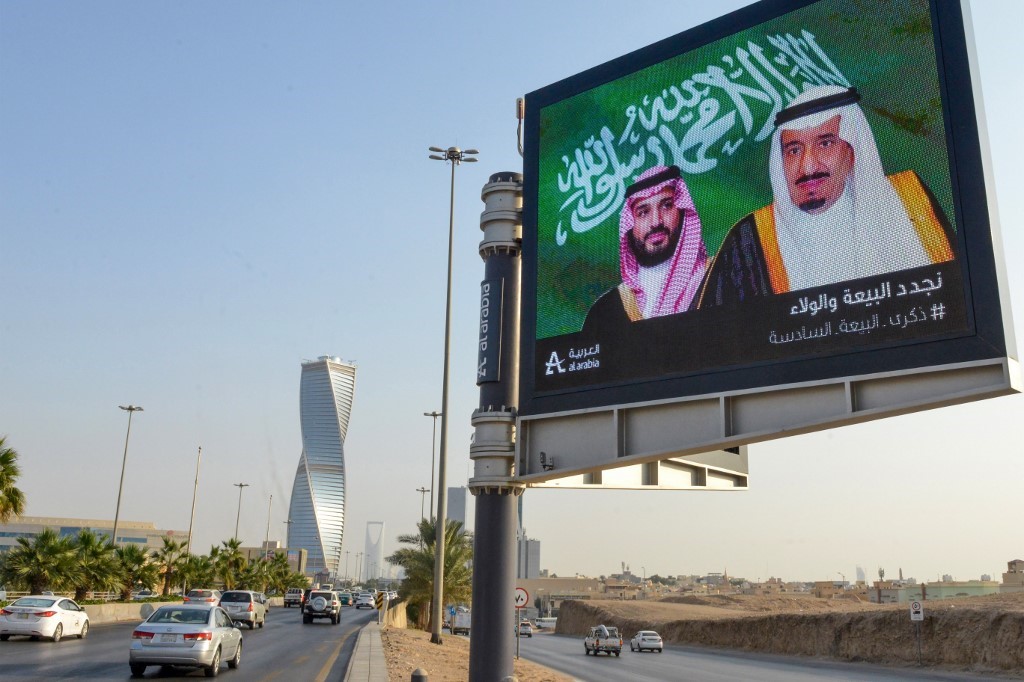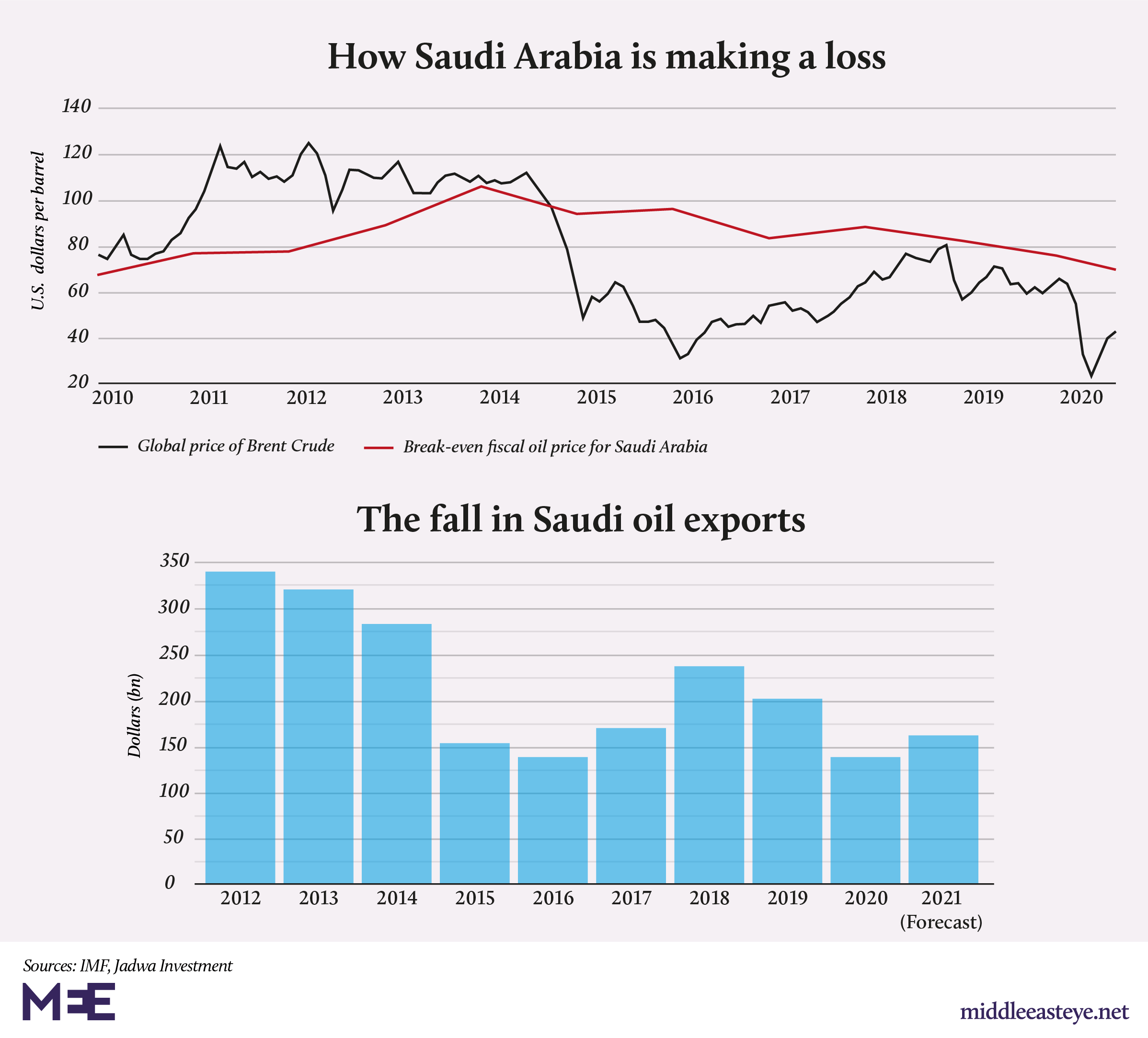Madawi al-Rasheed
Five years on, Saudis are worried about their livelihood and question the grand promises of Vision 2030

New VAT taxes, suspension of state subsidies, high utility and fuel bills and 14 percent unemployment figure made Saudis question the grand promises of Vision 2030
Failure to end Saudi dependence on oil, announced for 2020, has clearly stumbled. Furthermore, promises to speed up economic privatisation, diversification and Saudisation, coupled with the introduction of new taxes in 2018, suspension of many state welfare benefits, and rising unemployment, pushed the prince to focus on what appears to be agitated domestic audiences.
In the past the crown prince reached out to international media to trump his economic reforms; now perhaps none of the global English media would contemplate hosting him after a series of scandals, amongst them the murder of Saudi journalist Jamal Khashoggi, so the prince reach out to Saudis. He must feel their rumblings and discomfort with the limited number of fulfilled promises of Vision 2030.
The prince’s interview was dominated by several themes. Above all, Saudis in general, and especially the local private sector elite, are worried about their livelihood. New VAT taxes, suspension of state subsidies, high utility and fuel bills, as well as unemployment rate reaching 14.9 percent in the third quarter of 2020, made Saudis question the grand promises of Vision 2030.
Nationalistic hyperbole
The crown prince assured Saudis that as 50 percent of the population will be foreign workers in the future, most of the VAT burden will fall on their shoulders, thus making them pay back some of what they earn in the country. Such hidden nationalistic hyperbole may appeal to ordinary Saudis during difficult financial times, but it will make foreigners hesitate to rush to the country as they become heavily taxed residents.
Local businessmen, who in the past had relied on state contracts to provide services, worry about budget cuts, taxation and the occasional confiscation of their assets under the pretext of fighting corruption. The financial elite has felt alienated since the 2017 infamous Ritz Carton anti-corruption detention campaign, so now Mohammed bin Salman insists that he wants to make them a pillar of the new Saudi economic revival.
Perhaps the crown prince has given up on attracting direct foreign investment in a big way, and his last resort is to turn his attention to milking local merchant families. It remains to be seen whether they hurry to rescue the prince and his vision. Their cooperation requires security assurances rather than simply appealing to their national responsibility to protect the prince when his economic reforms stumble.
While the interview was conducted in Arabic, it was intercepted by occasional English words, thus confirming the prince as an Arabezee icon, the language of Westernised Arab youth. Mohammed bin Salman made the most of the "law of supply and demand", assuring Saudis that their oil will still be relevant to the global economy even if demand drops sharply and industrial countries shift to clean energy.
Realising that most Saudi citizens don’t have access to affordable housing, he spent a long time outlining new government promises and initiatives that will allow them to find a secure abode in the desert kingdom.
The crown prince reminded Saudis that he was wealthy before entering government but that he sympathises with poor Saudis who are struggling under various financial pressures - a nice solidarity gesture from a billionaire prince who bought a yacht, a palace and a suspicious - possibly fake - Salvatore Mundi painting that failed to find its place next to the Monalisa in the French Louvre Museum, and precipitated a scandal in art circles.
While some of those items may have been bought by the Public Investment Fund, under his directorship, it may not be long before this fund is plundered.
Control mechanism
Instead of creating an infrastructure to support equal economic development across the vast country, the prince wants to make the capital Riyadh, the seat of his ancestors’ power and the place where King Salman was governor for almost half a century, the city where most of the population is concentrated in the future. It already has around 7.5 million residents.
The expansion of Riyadh and the population displacement he envisages sound dodgy; it could be a control mechanism that allows the prince to survey the country and control it easily
It is interesting to know how the prince will provide drinking water for the envisaged population expansion and how he will create educational, and health infrastructures should he succeed to lure most Saudis to live in the capital.
The expansion of Riyadh and the population displacement he envisages sound dodgy; it could be a control mechanism that allows the prince to survey the country and control it easily, leaving other cities and regions to fall apart and crumble. The prince would be playing with fire as such a move may spark separatist movements and agitation in the peripheral regions that will become breeding grounds for radicalisation.
Perhaps he has given up on the far-flung territories of the north and south and expects them to remain only nominally attached to the kingdom. The Hijaz and the historical economic importance of Jeddah Port were overlooked in the interview and no mention was made of the pilgrimage to Mecca and Medina.
Religious radicalisation was briefly mentioned at the end of the interview only to insist that the Quran is Saudi Arabia’s constitution. In a fleeting moment, he dismissed the founder of the Wahhabi movement, Mohammad Ibn Abd al-Wahhab, as an irrelevant figure in the new Saudi Arabia. The prince assured Ibn Abd al-Wahhab’s followers that the preacher would really turn in his grave should Saudis continue to hold him sacrosanct.
The fall of the Al-Sheikh religious elite, the historical guardians of the Wahhabi movement and its alliance with the Saudi state, reached an unprecedented low when the prince appointed Turki Al-Sheikh, a grandson of the Wahhabi preacher who served under state founder Abdulaziz bin Saud, and a chum of MBS, to run the entertainment industry and later his sports initiatives.
Having been the pillars of Saudi radical religious interpretations for over two centuries, the Al-Sheikh are now faced with two options; either perish or become the pillars of social liberalisation. They have been cornered to reluctantly accept the second option instead of permanent redundancy.
Regional proximity
Saudi Arabia's western partners, especially the US, may be alarmed after Mohammed bin Salman suggested that he intends to develop close ties with Russia and China. He was optimistic when he mentioned that he agrees with the administration of US President Joe Biden on almost 90 percent of common issues.

Iran and the Yemen War were briefly discussed with ample platitudes that failed to explain his position on outstanding problems with Iran, although he invoked regional proximity and common interests and cooperation.
It is obvious that the prince’s show was meant for local consumption. Many Saudis are left with unanswered questions, for example, about the realisation of real economic revival, the plight of political prisoners and general political reforms that may one day include them in the decision-making process, such as national parliamentary elections, and more freedom of speech and association.
The depoliticisation of citizens is confirmed in this interview as Saudis continue to be depicted as recipients of state largesse, with no political ambitions whatsoever. Many will be wondering whether the crown prince is beginning to have a health problem such as a neck spasm or even Parkinson's Disease as he appeared unable to control his facial muscles during the interview.
It may possibly be a nervous twitch triggered by being the Son King during difficult and uncertain times.





No comments:
Post a Comment